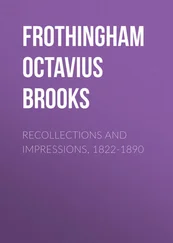Edmund Gosse - Aspects and Impressions
Здесь есть возможность читать онлайн «Edmund Gosse - Aspects and Impressions» — ознакомительный отрывок электронной книги совершенно бесплатно, а после прочтения отрывка купить полную версию. В некоторых случаях можно слушать аудио, скачать через торрент в формате fb2 и присутствует краткое содержание. Жанр: Критика, foreign_antique, foreign_prose, на английском языке. Описание произведения, (предисловие) а так же отзывы посетителей доступны на портале библиотеки ЛибКат.
- Название:Aspects and Impressions
- Автор:
- Жанр:
- Год:неизвестен
- ISBN:нет данных
- Рейтинг книги:4 / 5. Голосов: 1
-
Избранное:Добавить в избранное
- Отзывы:
-
Ваша оценка:
- 80
- 1
- 2
- 3
- 4
- 5
Aspects and Impressions: краткое содержание, описание и аннотация
Предлагаем к чтению аннотацию, описание, краткое содержание или предисловие (зависит от того, что написал сам автор книги «Aspects and Impressions»). Если вы не нашли необходимую информацию о книге — напишите в комментариях, мы постараемся отыскать её.
Aspects and Impressions — читать онлайн ознакомительный отрывок
Ниже представлен текст книги, разбитый по страницам. Система сохранения места последней прочитанной страницы, позволяет с удобством читать онлайн бесплатно книгу «Aspects and Impressions», без необходимости каждый раз заново искать на чём Вы остановились. Поставьте закладку, и сможете в любой момент перейти на страницу, на которой закончили чтение.
Интервал:
Закладка:
But his health was still poor, and for his constitution's sake he went in the summer of 1869 to Great Malvern. He went alone, and it is to be remarked of him that, social as he was, and inclined to a deep indulgence in the company of his friends, his habit of life was always in the main a solitary one. He had no constant associates, and he did not shrink from long periods of isolation, which he spent in reading and writing, but also in a concentrated contemplation of the passing scene, whatever it might be. It was alone that he now made a tour of the principal English cathedral and university towns, expatiating to himself on the perfection of the weather – "the dozen exquisite days of the English year, days stamped with a purity unknown in climates where fine weather is cheap." It was alone that he made acquaintance with Oxford, of which city he became at once the impassioned lover which he continued to be to the end, raving from Boston in 1870 of the supreme gratifications of Oxford as "the most dignified and most educated" of the cradles of our race. It was alone that during these enchanting weeks he made himself acquainted with the unimagined loveliness of English hamlets buried in immemorial leafage and whispered to by meandering rivulets in the warm recesses of antiquity. These, too, found in Henry James a worshipper more ardent, it may almost be averred, than any other who had crossed the Atlantic to their shrine.
Having formed his basis for the main construction of his English studies, Henry James passed over to the Continent, and conducted a similar pilgrimage of entranced obsession through Switzerland and Italy. His wanderings, "rapturous and solitary," were, as in England, hampered by no social engagement; "I see no people to speak of," he wrote, "or for that matter to speak to." He returned to America in April, 1870, at the close of a year which proved critical in his career, and which laid its stamp on the whole of his future work. He had been kindly received in artistic and literary circles in London; he had conversed with Ruskin, with William Morris, with Aubrey de Vere, but it is plain that while he observed the peculiarities of these eminent men with the closest avidity, he made no impression whatever upon them. The time for Henry James to "make an impression" on others was not come yet; he was simply the well-bred, rather shy, young American invalid, with excellent introductions, who crossed the path of English activities, almost without casting a shadow. He had published no book; he had no distinct calling; he was a deprecating and punctilious young stranger from somewhere in Massachusetts, immature-looking for all his seven-and-twenty years.
Some further uneventful seasons, mainly spent in America but diversified by tours in Germany and Italy, bring us to 1875, when Henry James came over from Cambridge with the definite project, at last, of staying in Europe "for good." He took rooms in Paris, at 29 Rue de Luxembourg, and he penetrated easily into the very exclusive literary society which at that time revolved around Flaubert and Edmond de Goncourt. This year in Paris was another highly critical period in Henry James's intellectual history. He was still, at the mature age of thirty-two, almost an amateur in literature, having been content, up to that time, to produce scarcely anything which his mature taste did not afterwards repudiate. The Passionate Pilgrim (1870), of which I have spoken above, is the only waif and stray of the pre-1873 years which he has permitted to survive. The first edition of this short story is now not easy of reference, and I have not seen it; the reprint of 1908 is obviously, and is doubtless vigorously, re-handled. Enough, however, remains of what must be original to show that, in a rather crude, and indeed almost hysterical form, the qualities of Henry James's genius were, in 1869, what they continued to be in 1909. He has conquered, however, in A Passionate Pilgrim , no command yet over his enthusiasm, his delicate sense of beauty, his apprehension of the exquisite colour of antiquity.
From the French associates of this time he derived practical help in his profession, though without their being aware of what they gave him. He was warmly attracted to Gustave Flaubert, who had just published La Tentation de St. Antoine , a dazzled admiration of which was the excuse which threw the young American at the feet of the Rouen giant. This particular admiration dwindled with the passage of time, but Henry James continued faithful to the author of Madame Bovary . It was Turgenev who introduced him to Flaubert, from whom he passed to Guy de Maupassant, then an athlete of four-and-twenty, and still scintillating in that blaze of juvenile virility which always fascinated Henry James. In the train of Edmond de Goncourt came Zola, vociferous over his late tribulation of having L'Assommoir stopped in its serial issue; Alphonse Daudet, whose recent Jack was exercising over tens of thousands of readers the tyranny of tears; and François Coppée, the almost exact coeval of Henry James, and now author of a Luthier de Crémone , which had placed him high among French poets. That the young American, with no apparent claim to attention except the laborious perfection of his French speech, was welcomed and ultimately received on terms of intimacy in this the most exclusive of European intellectual circles is curious. Henry James was accustomed to deprecate the notion that these Frenchmen took the least interest in him: "they have never read a line of me, they have never even persuaded themselves that there was a line of me which anyone could read," he once said to me. How should they, poor charming creatures, in their self-sufficing Latin intensity, know what or whether some barbarian had remotely "written"? But this does not end the marvel, because, read or not read, there was Henry James among them, affectionately welcomed, talked to familiarly about "technique," and even about "sales," like a fellow-craftsman. There must evidently have developed by this time something modestly "impressive" about him, and I cannot doubt that these Parisian masters of language more or less dimly divined that he too was, in some medium not by them to be penetrated, a master.
After this fruitful year in Paris, the first result of which was the publication in London of his earliest surviving novel, Roderick Hudson , and the completion of The American , Henry James left his "glittering, charming, civilized Paris" and settled in London. He submitted himself, as he wrote to his brother William in 1878, "without reserve to that Londonizing process of which the effect is to convince you that, having lived here, you may, if need be, abjure civilization and bury yourself in the country, but may not, in pursuit of civilization, live in any smaller town." He plunged deeply into the study of London, externally and socially, and into the production of literature, in which he was now as steadily active as he was elegantly proficient. These novels of his earliest period have neither the profundity nor the originality of those of his middle and final periods, but they have an exquisite freshness of their own, and a workmanship the lucidity and logic of which he owed in no small measure to his conversations with Daudet and Maupassant, and to his, at that time almost exclusive, reading of the finest French fiction. He published The American in 1877, The Europeans and Daisy Miller in 1878, and An International Episode in 1879. He might advance in stature and breadth; he might come to disdain the exiguous beauty of these comparatively juvenile books, but now at all events were clearly revealed all the qualities which were to develop later, and to make Henry James unique among writers of Anglo-Saxon race.
His welcome into English society was remarkable if we reflect that he seemed to have little to give in return for what it offered except his social adaptability, his pleasant and still formal amenity, and his admirable capacity for listening. It cannot be repeated too clearly that the Henry James of those early days had very little of the impressiveness of his later manner. He went everywhere, sedately, watchfully, graciously, but never prominently. In the winter of 1878-79 it is recorded that he dined out in London 107 times, but it is highly questionable whether this amazing assiduity at the best dinner-tables will be found to have impressed itself on any Greville or Crabb Robinson who was taking notes at the time. He was strenuously living up to his standard, "my charming little standard of wit, of grace, of good manners, of vivacity, of urbanity, of intelligence, of what makes an easy and natural style of intercourse." He was watching the rather gross and unironic, but honest and vigorous, English upper-middle-class of that day with mingled feelings, in which curiosity and a sort of remote sympathy took a main part. At 107 London dinners he observed the ever-shifting pieces of the general kaleidoscope with tremendous acuteness, and although he thought their reds and yellows would have been improved by a slight infusion of the Florentine harmony, on the whole he was never weary of watching their evolutions. In this way the years slipped by, while he made a thousand acquaintances and a dozen durable friendships. It is a matter of pride and happiness to me that I am able to touch on one of the latter.
Читать дальшеИнтервал:
Закладка:
Похожие книги на «Aspects and Impressions»
Представляем Вашему вниманию похожие книги на «Aspects and Impressions» списком для выбора. Мы отобрали схожую по названию и смыслу литературу в надежде предоставить читателям больше вариантов отыскать новые, интересные, ещё непрочитанные произведения.
Обсуждение, отзывы о книге «Aspects and Impressions» и просто собственные мнения читателей. Оставьте ваши комментарии, напишите, что Вы думаете о произведении, его смысле или главных героях. Укажите что конкретно понравилось, а что нет, и почему Вы так считаете.












